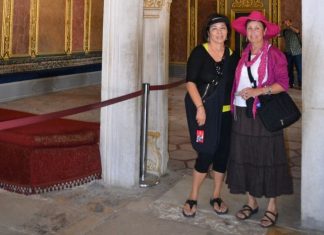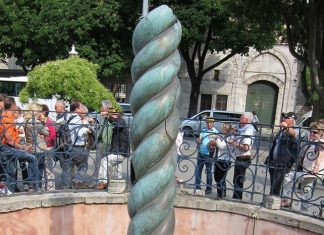The Next in Line
The Second Brother’s Position
Following the Ottoman succession law, Reshad Effendi, who was Sultan Abdul Hamid’s second brother, stood as the official heir to the throne. Since the eldest brother Murad had been declared insane and removed from consideration, Reshad became the most likely person to inherit the empire when Abdul Hamid died or was removed from power. This position made him both powerful and extremely dangerous in his brother’s eyes The Ottoman Succession Law and the Fate of Royal Brothers.
The Burden of Being Heir
Being the heir to the Ottoman throne was not a privilege but rather a burden that came with severe restrictions and constant surveillance. Reshad Effendi’s position meant that he was simultaneously the most important person in the empire after the Sultan and one of the most closely watched and controlled individuals in the entire Ottoman realm.
Life Under House Arrest
Twenty Years of Imprisonment
Reshad Effendi had been kept as a practical prisoner for twenty years by the time this article was written. This long period of confinement meant that he had spent most of his adult life under strict supervision and control. The length of his imprisonment shows how seriously Sultan Abdul Hamid took the threat posed by his brother’s existence.
Hidden from Public View
Due to his long imprisonment, very few people actually knew what Reshad Effendi looked like or what kind of person he was. This isolation was intentional, as the Sultan wanted to prevent his brother from building any kind of public support or recognition that might be used against him. By keeping Reshad hidden, Abdul Hamid ensured that his brother remained unknown to the people who might otherwise support a change in leadership sofia daily tours.
Personal Qualities and Character
Superior Intellect and Refinement
Despite his isolation, reports suggested that Reshad Effendi was a man of considerable refinement, education, and integrity. Those who knew him described him as being much superior to his imperial brother in both intellect and physical appearance. This comparison must have been particularly galling to Sultan Abdul Hamid, as it suggested that the heir was better qualified to rule than the current sultan.
Educational Background
Reshad Effendi’s education appears to have been quite extensive, despite his confinement. He was able to read French fluently, which was considered the language of diplomacy and culture in the 19th century. This linguistic ability allowed him to stay connected to European thought and culture, even while being physically isolated from the outside world.
Living Arrangements
Winter Quarters in the Capital
During the winter months, Reshad Effendi lived in a portion of the Dolma-Baghtcheh Palace in Constantinople. This palace was one of the most beautiful and modern royal residences in the Ottoman Empire, located on the European side of the Bosphorus. However, even this luxurious accommodation was essentially a prison, as he was not free to leave or receive visitors as he chose.
Summer Retreat
During the summer season, Reshad was allowed to move to Machla, a suburban town near Constantinople. There, he had access to a farm and a pretty villa, which provided him with some relief from the urban confinement of the palace. This arrangement gave him a chance to engage in agricultural activities and enjoy a more rural environment, though he was still under constant surveillance.
Geographic Restrictions
Throughout his twenty years of confinement, Reshad Effendi had never been allowed to leave the immediate vicinity of Constantinople. This restriction meant that he was completely cut off from the rest of the Ottoman Empire and had no opportunity to travel to other provinces or build relationships with local officials who might support his eventual claim to the throne.
Connection to the Outside World
Limited Communication
The Sultan’s orders strictly limited Reshad Effendi’s communications with the outside world. Every letter, visitor, and piece of information that reached him was carefully monitored and controlled. This isolation was designed to prevent him from building any kind of network or support system that might threaten his brother’s rule.
European Publications
Despite these restrictions, Reshad was said to receive the principal newspapers and reviews of Europe that were printed in French. This access to European publications allowed him to stay informed about international affairs and intellectual developments, even while being cut off from Ottoman domestic politics. Reading these materials also helped him maintain his education and cultural sophistication.
Political Connections and Suspicions
The Damad-Mahmoud Pasha Connection
There were rumors that Reshad Effendi had been in sympathy and communication with his brother-in-law, the late Damad-Mahmoud Pasha. This connection was particularly significant because Damad-Mahmoud Pasha had fled the country to escape a death sentence imposed because of his liberal political opinions.
Liberal Political Associations
The suggestion that Reshad was connected to liberal political figures was extremely dangerous for him. During this period, Sultan Abdul Hamid was deeply suspicious of anyone who favored constitutional government or limitations on royal power. Any association with liberal reformers could have provided justification for even harsher treatment or elimination.
The Challenge of Proving Connections
The author notes that these political connections were “purely conjecture” because they were impossible to prove. If Sultan Abdul Hamid, with all his extensive spy network and surveillance apparatus, could not discover evidence of such communications, it seemed unlikely that ordinary gossips would be able to learn anything definitive about them.
The Sultan’s Spy Network
Extensive Surveillance System
The article reveals that Sultan Abdul Hamid maintained an extensive spy network throughout the empire. This system was so thorough that it monitored even the most private communications of royal family members. The existence of such a surveillance apparatus shows how paranoid the Sultan had become about potential threats to his rule.
The Limits of Surveillance
Interestingly, the author suggests that even this extensive spy network had its limitations. The fact that rumors and speculation continued to circulate about Reshad’s political connections indicates that some information remained hidden, even from the Sultan’s intelligence services.
The Tragic Irony
A Better Leader in Prison
The situation of Reshad Effendi represents one of the great ironies of the Ottoman Empire during this period. The person who was reportedly best qualified to lead the empire—more intelligent, better educated, and more refined than the current Sultan—was being kept as a prisoner precisely because of these qualities. This situation weakened the empire by preventing its most capable leader from contributing to its governance.
The Cost of Paranoia
Sultan Abdul Hamid’s paranoid control of his brother demonstrates how the Ottoman succession system created situations that weakened the empire. By imprisoning potentially capable leaders, the Sultan was protecting his own power at the expense of the empire’s welfare and effectiveness.
Historical Significance
A Symbol of Imperial Decline
Reshad Effendi’s story symbolizes the broader problems facing the Ottoman Empire during this period. Traditional systems that had once maintained order were now creating dysfunction and preventing the empire from adapting to modern challenges. The imprisonment of capable leaders represented a tragic waste of human resources at a time when the empire needed strong leadership.
The Question of Legitimacy
The contrast between the imprisoned heir and the ruling Sultan raised important questions about the legitimacy of Abdul Hamid’s rule. If Reshad was indeed superior in intellect and character, his imprisonment highlighted the arbitrary nature of power in the Ottoman system and the way that fear rather than merit determined who held authority.







